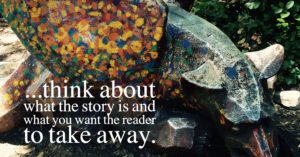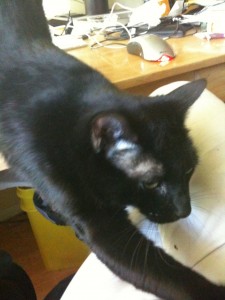
 Yesterday I taught a day-long workshop on rewriting and editing one’s work for Clarion West. I usually do this as a two hour online workshop, so it was interesting to take the class and get a chance to really flesh it out, particularly since I can use this version to create an on-demand version.
Yesterday I taught a day-long workshop on rewriting and editing one’s work for Clarion West. I usually do this as a two hour online workshop, so it was interesting to take the class and get a chance to really flesh it out, particularly since I can use this version to create an on-demand version.
As with all writing advice, mileage will vary according to the individual. The best thing as a writer that you can do is to pay attention to your own process and make it more effective. Experiment with lots of things, identify the practices that work, and incorporate them into your process. Keep experimenting, mixing things up a little, every once in a while, writing to the sound of whale songs, or dictating while hiking, or using a pen rather than the keyboard — it doesn’t matter what as long as you keep testing things in a way that lets you grow as a writer.
...

Some people are taking the class in order to edit their own stuff, others to edit for other folks, a couple for a combination of that. We talked about what a developmental edit is intended to do, and how it’s different from a copy-edit. In fact, you want to avoid copy-editing (other than a couple of cases which I’ll get to in a minute) because often that sentence you’re tinkering with will end up discarded or substantially revised in the final version.
Honing your editing ability to where you can trust it is one way to free yourself up when writing. Instead of listening to the internal editor telling you that sentence isn’t perfect or that you need to check that name on Wikipedia before using it, you can assure that editor it will get its chance during the revision process and go on writing.
...
I’ve been reading Donald Maass’s excellent, excellent book Writing the Breakout Novel (which is, unfortunately, not available on the Kindle so I actually had to do the archaic order and wait for a hardcopy thing) and it’s at a perfect time for me since I’m beginning the second pass at the current project.

I find it handy to do this sort of pass. Last time, when revising Phat Fairy, I used a list from Holly Lisle and went through scene by scene, checking for criteria like what got accomplished, were there any loose ends, what characters appeared, was there a sensory moment, was there character development for at least one character. I did something similar with The Moon’s Accomplice, which was the first novel that I completed. There is much to be said for making your revision process efficient and mechanical. While moments of inspiration are useful, it’s the elbow grease put into the scenes at this point that pays off.
...
Want access to a lively community of writers and readers, free writing classes, co-working sessions, special speakers, weekly writing games, random pictures and MORE for as little as $2? Check out Cat’s Patreon campaign.

"(On the writing F&SF workshop) Wanted to crow and say thanks: the first story I wrote after taking your class was my very first sale. Coincidence? nah….thanks so much."